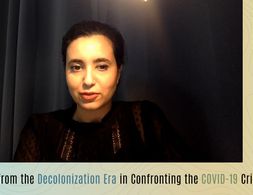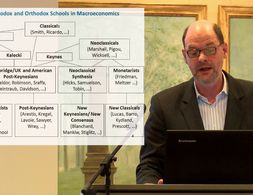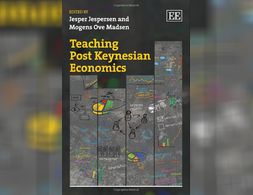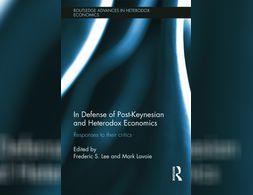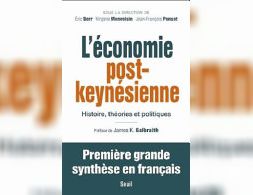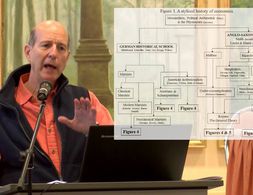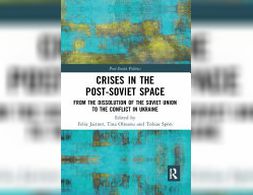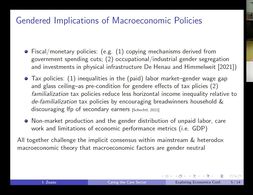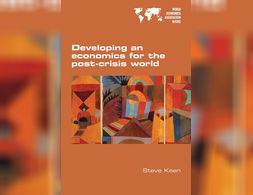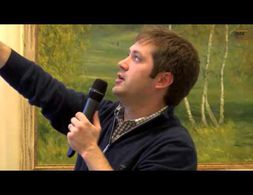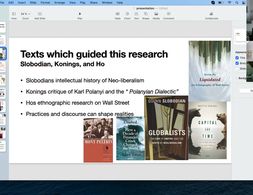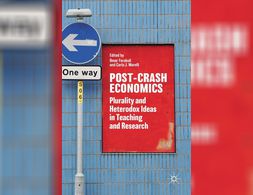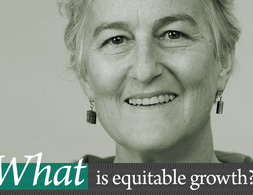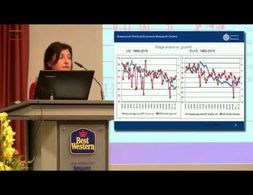382 results
Mainstream economic theory has been increasingly questioned following the recent global financial crisis. Marc Lavoie shows how post-Keynesian theory can function as a coherent substitute by focusing on realistic assumptions and integrating the financial and real sides of the economy.
The outbreak of COVID-19 has substantially accelerated the digitalization of the economy. Yet, this unprecedented growth of digital technology brought novel challenges to the labour market. Rise in income inequalities and precarious working conditions or polarization of jobs. In this essay, we try to assess what tools to use to counter these trends.
This book argues that mainstream economics, with its present methodological approach, is limited in its ability to analyze and develop adequate public policy to deal with environmental problems and sustainable development. Each chapter provides major insights into many of todays environmental problems such as global warming and sustainable growth.
Though apparently siblings from the same family, New Keynesianism and Post-Keynesianism are completely different schools of economic thought. As to why and in what regard exactly, that is what this book is all about. While the former is the official label of the current mainstream in economic research and teaching (rather than neoclassic economics, which would be more apt a term), the latter tries to preserve the original thinking of John Maynard Keynes, but also additional ideas and concepts of all those building on his work.
Jihen Chandoul, a member of the Post-Colonialisms Today Working Group, discusses the impact of import-dependency on African food supply chains since the onset of the COVID-19 pandemic.
This thoroughly revised and updated second edition provides a comprehensive guide to Post Keynesian methodology, theory and policy prescriptions. The Companion reflects the challenges posed by the global financial crisis that began in 2008 and by the consolidation of the New Neoclassical Synthesis in macroeconomic theory.
This lecture by Prof. Dr. Eckhard Hein is part of the Introductory Lectures on Heterodox Economics at the 20th FMM Conference in 2016. It gives a good overview about where Post-Keynesian Economics can be located and what it is all about.
Yao Graham, coordinator of Third World Network- Africa, reflects on lessons learned from past Economic Partnership Agreements (EPAs), specifically as they relate to the Post-Cotonou Agreement.
This book contends that post Keynesian economics has its own methodological and didactic basis, and its realistic analysis is much-needed in the current economic and financial crisis.
Post-Keynesian and heterodox economics challenge the mainstream economics theories that dominate the teaching at universities and government economic policies. And it was these latter theories that helped to cause the great depression the United States and the rest of the world is in.
La science économique dominante est-elle impuissante face aux crises ? Existe-t-il une alternative ? Dans cet ouvrage collectif, Éric Berr (université de Bordeaux), Virginie Monvoisin (Grenoble École de management) et Jean-François Ponsot (université Grenoble-Alpes) présentent l'économie post-keynésienne, une approche novatrice de l'économie.
Tom Palley provides a very clear and insightful description of the post-Keynesian school of economics by tracing back its connections to the different historical schools of thought.
An overview of the last century economic theories asking what makes a heterodox economist. This lecture focuses on the evolution of the various academic traditions in economics. Lavoie presents his own typology for categorising seminal work within the post-Keynesian tradition while leaving space to acknowledge that categories are not binary, but can be used to help understand the different traditions, and how they have developed over the last decades.
Pluriverse: A Post-Development Dictionary contains over one hundred essays on transformative initiatives and alternatives to the currently dominant processes of globalized development, including its structural roots in modernity, capitalism, state domination, and masculinist values.
The blog post by Marc Lavoie contrasts what he perceives as the two main interpretations of the current inflationary tendencies (the 'excessive demand inflation' story and the 'profit inflation' story) and contrasts them with a third interpretation. This interpretation acknowledes rising profits but argues in favor of a different mechanism that centers on changes in the relative composition of costs.
À l'occasion de la parution de la première grande synthèse en français sur l'école post-keynésienne, entretien de Mediapart avec Virginie Monvoisin, professeure à la Grenoble École de Management, qui a coordonné l'ouvrage, et Dany Lang, maître de conférence à Paris 13 qui y a participé.
Although sometimes used as synonyms, economic growth and economic development refer to different processes. While economic growth refers to an increase in real national income and output (i.e., GDP growth rate), economic development refers to an improvement in the quality of life and living standards (i.e., life expectancy).
The principle of effective demand, and the claim of its validity for a monetary production economy in the short and in the long run, is the core of heterodox macroeconomics, as currently found in all the different strands of post-Keynesian economics (Fundamentalists, Kaleckians, Sraffians, Kaldorians, Institutionalists) and also in some strands of neo-Marxian economics, particularly in the monopoly capitalism and underconsumptionist school In this contribution, we will therefore outline the foundations of the principle of effective demand and its relationship with the respective notion of a capitalist or a monetary production economy in the works of Marx, Kalecki and Keynes. Then we will deal with heterodox short-run macroeconomics and it will provide a simple short-run model which is built on the principle of effective demand, as well as on distribution conflict between different social groups (or classes): rentiers, managers and workers. Finally, we will move to the long run and we will review the integration of the principle of effective demand into heterodox/post-Keynesian approaches towards distribution and growth.
From the Dissolution of the Soviet Union to the Conflict in Ukraine The breakup of the Soviet Union led to the creation of new states and territorial conflicts of different levels of intensity Scrutinising the post Soviet period this volume offers explanations for both the frequency and the intensity of …
On July 2020 ZOE-Institute published a unique platform for transformative policymaking: Sustainable Prosperity. Building on insights from new economic thinking the platform provides knowledge about ideas, arguments and procedures that support effective promotion of political change. It aims to strengthen change makers in public policy institutions, who are working on an ambitious green and just transition. As such, it provides convincing arguments and policy ideas to overcome the reliance of economic policy on GDP growth
Exploring Economics, an open-source e-learning platform, giving you the opportunity to discover & study a variety of economic theories, topics, and methods.
In spite of the manifold critique about the state of economics in the aftermath of the financial crisis, an even increasing presence of economists and economic experts can be observed in the public sphere during the last years. On the one hand this reflects the still dominant position of economics in the social sciences as well as the sometimes ignorant attitude of economists towards findings of other social sciences. On the other hand this paper shows that the public debate on politico-economic issues among economists is dominated by a specific subgroup of economists, tightly connected to an institutional network of “German neoliberalism”. This group of “public economists” (i) is dominant in public debates even after the financial crisis, (ii) reproduces the formative German economic imaginary of the Social Market Economy in a German neoliberal interpretation and (iii) has a good access to German economic policymaking, rooted in a long history of economic policy advice.
Caring the Care Sector - Contributions of Feminist Macroeconomics to Economics in the Post-COVID Era
This lecture was held in the context of the a two day conference called Which pluralism for thinking about how to achieve a more sustainable and resilient economy The practices institutions and system logics of today s economy are not suitable for appropriately addressing fundamental human needs The climate crisis …
This book is a collection of Steve Keen's influential papers published over the last fifteen years. The topics covered include methodology, microeconomics, and the monetary approach to macroeconomics that Keen - along with many other non-mainstream economists - has been developing.
Based on a paper by Jason Hickel and Giorgos Kallis Decoupling refers to the separation of economic value creation material extraction and pollution. Ecological limits pose a challenge to growth-led development and the low historical and predicted rate of decoupling suggests that long-term sustainable growth-led development is impossible.
This is an introductory lecture to Stock Flow Consistent SFC modelling Antoine Godin presents this family of macroeconomic models which is based on a rigorous accounting framework and guarantees a correct and comprehensive integration of all the flows and the stocks of an economy SFC models focus especially on interactions …
This lecture was held in the context of the a two day conference called Which pluralism for thinking about how to achieve a more sustainable and resilient economy The practices institutions and system logics of today s economy are not suitable for appropriately addressing fundamental human needs The climate crisis …
This book demonstrates the continuing relevance of economics for understanding the world, through a restatement of the importance of plurality and heterodox ideas for teaching and research.
What is “equitable growth” and how do we measure it? A better understanding of equitable growth—and how to measure it—can improve our understanding, inform decisions and lead to better outcomes for all.
How should we discuss welfare when understanding the role of growth and the viability of Growth-led development? One option is to look at subjective happiness. This provides an anti-materialistic view which may superficially appear more compatible with significant reductions in consumption in order to remain within safe ecological limits.
Özlem Onaran analyses the current problems of secular stagnation from a global perspective. At the core of global economic problems is insufficient demand caused by falling wage shares, because most individual countries, and the world as a whole are “wage-led”. Hence a strategy for global growth is to aim at increasing wages and thus the wage share, and the abandonment of policies focusing purely on national competitiveness. Financialization has broken the link between corporate profitability and investment. Reregulation of finance and higher public investment is required in order to crowd in private investment, in this way, reversing the declining trend of potential output growth.
How did economic growth become paramount as the public policy objective? Peter Victor discusses the role of growth within institutions, asks if it is possible to imagine a degrowth economy and discusses the role of grass-root movements.
Nous utilisons des cookies sur notre site Web. Cliquez sur Accepter pour nous aider à améliorer constamment Exploring Economics !





